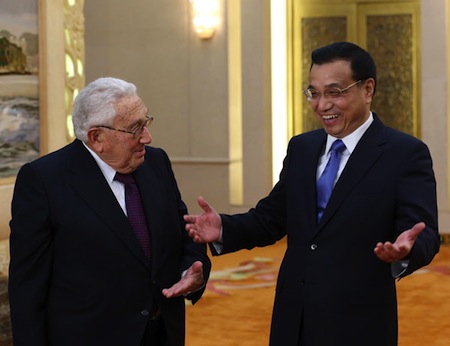Henry Kissinger, the U.S. secretary of state and national security adviser who paved the way for U.S. president Richard M. Nixon’s historic visit in February 1972 and thereafter, the normalization of U.S.-Chinese relations, met with Li Keqiang (李克强), the new premier of the People’s Republic of China on Tuesday:
[Li] said China is willing to work with the US to develop an unprecedented type of relationship in order to allow both sides to benefit from bilateral cooperation and play their due roles in maintaining world peace.
Kissinger highlighted the vital importance of US-China relations in promoting world peace and development, suggesting that both sides should work on long-term planning and strengthen communication to foster ties.
It must have been quite a stunning chat, considering that the current ‘Fifth Generation’ of leadership is essentially four generations of Chinese governance removed from the generation that Kissinger and Nixon encountered — Chinese premier Zhao Enlai (周恩来) and Chinese Communist Party chairman Mao Zedong (毛泽东). Like him or love him, Kissinger remains one of the top old-school Sinologists in the United States, writing at age 89 a new book, On China, just last year. When Nixon visited China, Li was just 17 years old. The change that China has seen in the ensuing 41 years is one of the most amazing transformations of any human society in such a short period of time.
More background here on Li from my seven-part series from November 2012 on the seven members of the Politburo Standing Committee of the Chinese Communist Party (中国共产党). Li speaks fluent English; unlike many of his colleagues on the Standing Committee, he is a protégé of Hu Jintao (胡锦涛) and unlike Chinese president Xi Jinping (习近平), Li is not a princeling. An economic reformer, Li served as the Party secretary of Henan province previously, and he’s emphasized since becoming premier that his chief tasks will be to roll back Chinese government spending in favor of private sector development, corruption and the massive size of Chinese government bureaucracy, and tackling the growing gap between China’s rich and poor.
